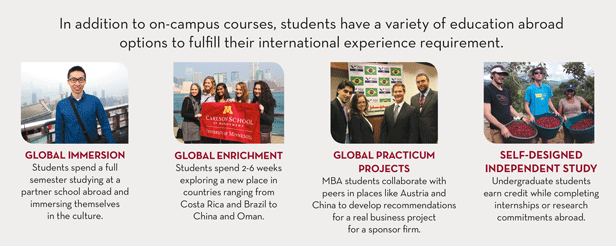
Shaping Exceptional Global Business Leaders
Friday, April 1, 2016
All Carlson School undergraduate and MBA students are required to complete an international experience as a key component of the curriculum. The Carlson Global Institute studies the impacts of education abroad on students’ knowledge, skills, and abilities.
Over the last several years, the Carlson Global Institute (CGI) has pursued a series of research endeavors to verify the link between international experiences and increased global and intercultural competence. The research examined how studying abroad affects global competence and intensity of global mindsets in its participants.
One study scored undergraduate students’ overall global competence using the Intercultural Development Inventory. The results clearly showed students who participated in an international program demonstrated a higher motivation to become more globally competent.
Participants in semester-long programs showed the highest level of intercultural development, while participants in short-term programs scored close behind.
“To be globally minded is to be skilled at dealing with uncertainty, to be comfortable interacting with people from unfamiliar cultures, and to be more willing to accept cultural norms other than your own,” says Associate Dean of Global Initiatives Michael Houston. “It’s having a framework to guide your understanding of different cultures.”
An accompanying study of part-time MBA students showed similar outcomes. CGI evaluated these students using the Global Mindset Inventory, an assessment tool designed to measure a global leader’s ability to better influence individuals, groups, and organizations unlike themselves.
In addition to identifying differences among students who had or had not studied abroad, the research factored in the respondent’s progress in the MBA program—whether the student was early in his or her MBA studies, nearing graduation, or had recently graduated.
Regardless of a student’s progress in the program, those who had an international experience showed significantly higher global mindset scores. This means the experience of studying abroad was instrumental in helping students understand and interact with people from diverse cultures.
This evidence proves what the school has long understood about the benefits of international experiences for current and future professionals: studying abroad develops global leaders. Education abroad supports the creation of a workforce in Minnesota and beyond that is poised to succeed in a world where global business is the norm, whether for a Fortune 500 company or a start-up.
What’s the impact of international education?
- Research demonstrates that students who participate in an international experience reap a variety of benefits:
- Increased ability to interact with peers across cultures
- Improved understanding of differences between the United States and other cultures
- Increased independence and self-reliance
- Proficiency in navigating unfamiliar contexts or problems
- Higher motivation to improve global competence
- Enhanced creativity
- Ability to better adapt behavior and communication to fit cultural norms
- Increased interest in attending graduate school
- Better understanding of similarities and differences in cross-cultural business practices
- Improved proficiency in solving problems and analytical thinking
- Enhanced language capabilities
- Higher productivity in diverse teams
- Increased tolerance for working through ambiguous or unfamiliar situations

